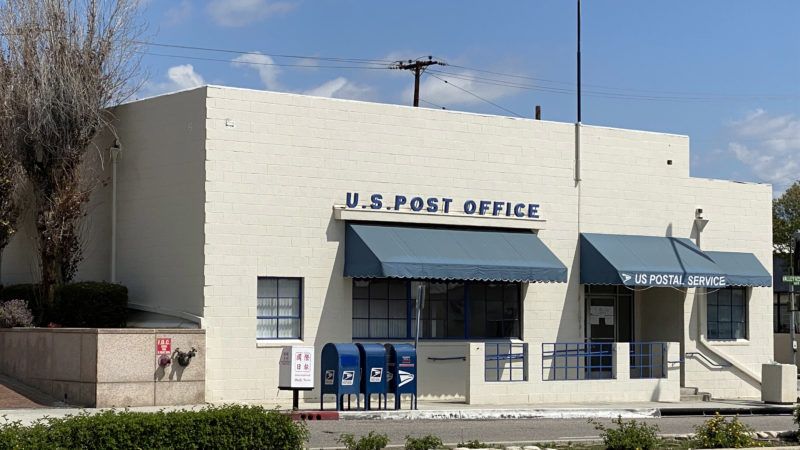The Coronavirus Has Exposed Governmental Failures. It Might Also Offer Hope for Change.
Government agencies and public utilities are the most preposterous examples of stasis. The coronavirus might force them, finally, to innovate and join the modern world.

"The weeks go by in a meaningless blur," my wife complained. "What difference does it make if it's Thursday, or Tuesday or Saturday?" She expressed the frustration most of us feel as we hunker down at home, venturing out only to buy necessities and living without human contact. I bumped into a friend the other day and he instinctively stuck out his hand to shake—as I shuddered at that once-common greeting.
My occasional errands reflect the new, post-apocalyptic universe. The Post Office was draped in plastic sheeting to divide customers from clerks, providing the feel of a nuclear-waste disposal site. Everyone is walking around with masks. Stores allow customers to enter in dribs and drabs, as each person stands in taped-off spots six feet from one another. I've watched dystopian movies with a less-ominous vibe.
So, it's an odd time to be looking on the bright side of a societal shutdown that is distorting our lives, killing businesses and obliterating jobs. But eventually the infections will drop and officials will lift the "stay at home" orders. While it may take a long time before we're hugging and shaking hands again, life eventually will approach normal. At that point, we might be ready to rethink some of the stodgy ways that we've been conducting our lives.
As a slow adopter of new technologies, I still remember going into a record store to buy some new vinyl—only to realize that the store no longer sold LPs. It sold compact discs and cassette tapes only (remember them?). We'd head to the video store on a Saturday night and peruse the racks of VHS and Betamax tapes. It wasn't long ago, either, when a few of us gathered around a colleague looking at his nifty new device called a "smart phone."
During a period of incomparable technological revolutions, however, our public services—and many of our work lives—have remained remarkably unchanged. Sure, all businesses and agencies use the Internet and new technologies in most aspects of their work. But, judging by rush-hour traffic and commuter patterns, most people still queue up on the freeway to work at an office park or shop at a brick-and-mortar business.
Government agencies and public utilities are the most preposterous examples of stasis. We can (kind of, sort of) complete some tasks on the Department of Motor Vehicles website. We can pay our electric bill online. You can check on the status of your traffic ticket on the court website. You can even track an overnight package that you sent via the Postal Service. Mostly, though, these agencies operate as they operated in 1983, or 1965 for that matter.
Even odder, the public schools aren't appreciably different from when the first public school systems were created eons ago. Oh yeah, we now bus kids to the school room, float bonds to build fancy gyms and prosecute the parents of truants. But the model is the same. Your kids sit in a classroom for a set period of time, learning whatever it is the educational authorities have determined that they must learn. Colleges haven't changed too much, either.
In COVID-19-ravaged New York City, the schools are shut down for obvious reasons. An unintentionally humorous New York Times article reported on the trials and tribulations of a school system that's figuring out how to implement some form of distance learning so students could still graduate on time. The article quoted one teacher who "had never heard of Zoom until two weeks ago" but "had some familiarity with Google Classroom, unlike many colleagues who only used their computers for email."
Yikes. At least the New Yorkers are trying, even if the effort has the feel of the old Soviet GUM department store trying to figure out how to compete with Costco. As that state's schools shut down, the Pennsylvania Association of School Administrators called for a moratorium on enrollments in cyber charter schools, according to a recent Washington Examiner report.
That crystallized why so little ever changes in the public sector: the system is designed to protect the current system and its workers, not to provide the most effective form of education. Why do you think that most government agencies, which have suddenly closed operations during this crisis, aren't offering many ways to provide services? Because you aren't a customer but a subject—there's no incentive for them to make your life easier.
The big question is whether, after this crisis ends, Americans are willing to look at what has worked and what hasn't—and take on the vested interests that protect the government, in particular, from innovating and serving us better. I'm not suggesting that we emerge from this crisis by spending even more time with our faces plastered to a computer screen, but rather that we come out of it with a new sense of creativity and possibility.
This column was first published in the Orange County Register.


Show Comments (50)